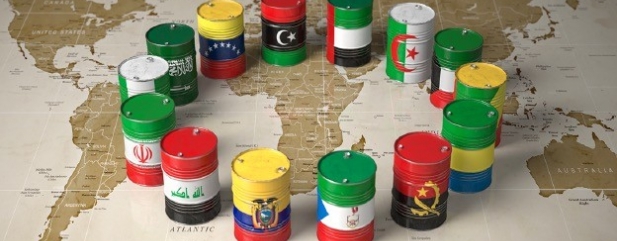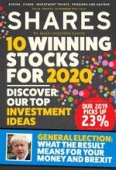Archived article
Please note that tax, investment, pension and ISA rules can change and the information and any views contained in this article may now be inaccurate.
Where next for the price of oil and its producers?

OPEC is ending 2019 where it ended last year – on the back foot, trying to support the price of oil with production cuts pushed through in conjunction with Russia and other countries who are not members of the cartel.
The extra reduction, which takes the total to 1.7m barrels of oil a day, is giving the price of crude a little lift but not enough to really give succour to shares in oil explorers and producers.
Looking at the S&P Global 1200 index, the energy sector is the worst performer among the 11 major industrial groupings that make up the benchmark and the only one that has failed to provide a double-digit percentage total return in sterling terms:

Looking at the MSCI World global equity benchmark, energy is down to an index weighting of less than 5%, right down by its all-time lows.
That means the energy constituents of the 1,650 member index have a combined market cap of $2.1trn – which is less than the current combined valuation of the two largest stocks, Apple and Microsoft.

Investors with exposure to individual oil firms, specialist energy funds or geographic stock indices with a hefty exposure to oil companies (including the FTSE 100) must now decide whether the latest bout of oil stock underperformance is merely cyclical or the result of something more structural.
Cyclical issues
It is possible to argue that oil’s woes are merely cyclical. The MSCI energy sector is trading at the same level as it did in March 2005 and the actual oil price is barely changed from August of the same year in nominal terms. This may not be a coincidence. In inflation-adjusted terms, this means oil is cheaper still.

The problem seems be one of supply, thanks to the boom in US shale oil production, which is now exceeding 9m barrels a day equivalent, up from 1.5m a decade ago.
Oil bulls will point out how the US shale boom is turning to bust. The HaynesBoone Oil Patch Bankruptcy Monitor reveals that 33 US oil and gas drillers have filed for bankruptcy so far in 2019, up from 28 in the whole of last year, thanks to the sector’s $100bn in borrowing, which mean even a flat oil price is straining some balance sheets.
As a result US shale oil output is up ‘just’ 13% year-on-year (or 1m barrels a day), thanks in part to financial distress at some of the debt-funded shale drillers. There could be more pain to come and the chart shows how lower oil prices reined in US shale output in 2015-16.
Secular issues
This provides some support to the argument that the best cure for low oil prices is low oil prices, as supply is squeezed out of the market in a normal cycle.
Whether an era of unprecedentedly cheap money, as a result of zero or negative interest rates as well as quantitative easing will allow enough bankruptcies is an open question.

A stronger case for a secular stagnation or outright decline in oil price and oil stocks lies in the rise of alternative energy sources, relative to hydrocarbons.
This story is yet to play out, since oil demand continues to rise. According to data from the US Energy Information Administration, global annual oil consumption has fallen just five times since 1980 and only twice this century. On each occasion (1981-1983 and 2008-09) the reason was a deep recession.
As such, the world is yet to wean itself away from crude but the Paris Climate Accord and other initiatives targeting carbon neutrality, let alone the rise of solar and wind power and electric vehicles, lead many to hope that the process will begin soon.
If that is the case, then oil fields could become stranded assets, worth less than investors think – and asset write-downs by America’s Chevron and Spain’s Repsol mean this re-evaluation may already be happening.
A further secular theme to consider is the rise of environmental, social and governance (ESG) issues on investor sentiment.
It is possible that more investors will simply shun oil stocks on ethical grounds. This could hurt – the lower their share prices go, the lower their weighting in the headline indices and the more shares that passive and tracker funds will sell as a result, in what could become a self-perpetuating trend.
Equally, contrarians could argue that passive money departing the sector before its economic use comes to an end will create a value opportunity for active money to exploit.
We shall see, but this is no academic issue for investors in the UK, since the energy sector is forecast to produce 16% of the FTSE 100’s profits in 2020 and pay 20% of its dividends.
Important information:
These articles are provided by Shares magazine which is published by AJ Bell Media, a part of AJ Bell. Shares is not written by AJ Bell.
Shares is provided for your general information and use and is not a personal recommendation to invest. It is not intended to be relied upon by you in making or not making any investment decisions. The investments referred to in these articles will not be suitable for all investors. If in doubt please seek appropriate independent financial advice.
Investors acting on the information in these articles do so at their own risk and AJ Bell Media and its staff do not accept liability for losses suffered by investors as a result of their investment decisions.
Issue contents
Editor's View
Feature
- Top performing funds of 2019
- What were the key themes for small caps in 2019?
- Big companies with big decisions to make in 2020
- All change: an unusual period for FTSE 100 CEOs
- Tracking the performance of the biggest emerging markets
- Emerging markets: Views from the experts
- Is inflation really dead and what can investors do if it isn't?
Great Ideas
- Share pick for 2020: IG Design
- Share pick for 2020: Lloyds Banking
- Share pick for 2020: Redrow
- Our 2019 picks have smashed the market with a 23% return
- Share pick for 2020: Luceco
- Four great funds to buy for 2020
- Share pick for 2020: Kainos
- Share pick for 2020: Begbies Traynor
- Share pick for 2020: Hotel Chocolat
- Share pick for 2020: Centrica
- Shares pick 2020: Wizz Air
- Share pick for 2020: Schroders
 magazine
magazine








